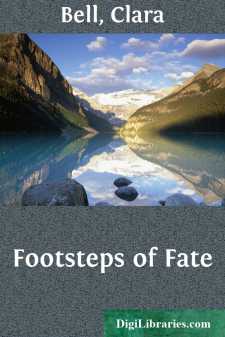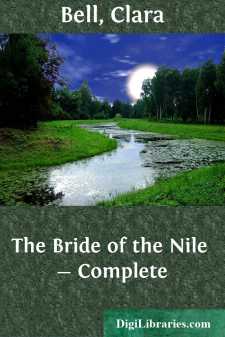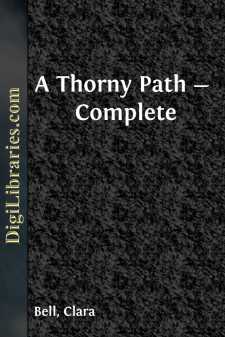Categories
- Antiques & Collectibles 13
- Architecture 36
- Art 48
- Bibles 22
- Biography & Autobiography 813
- Body, Mind & Spirit 142
- Business & Economics 28
- Children's Books 14
- Children's Fiction 11
- Computers 4
- Cooking 94
- Crafts & Hobbies 4
- Drama 346
- Education 46
- Family & Relationships 57
- Fiction 11828
- Games 19
- Gardening 17
- Health & Fitness 34
- History 1377
- House & Home 1
- Humor 147
- Juvenile Fiction 1873
- Juvenile Nonfiction 202
- Language Arts & Disciplines 88
- Law 16
- Literary Collections 686
- Literary Criticism 179
- Mathematics 13
- Medical 41
- Music 40
- Nature 179
- Non-Classifiable 1768
- Performing Arts 7
- Periodicals 1453
- Philosophy 64
- Photography 2
- Poetry 896
- Political Science 203
- Psychology 42
- Reference 154
- Religion 513
- Science 126
- Self-Help 84
- Social Science 81
- Sports & Recreation 34
- Study Aids 3
- Technology & Engineering 59
- Transportation 23
- Travel 463
- True Crime 29
Footsteps of Fate
by: Clara Bell
Description:
Excerpt
THE DUTCH SENSITIVISTS.
In the intellectual history of all countries we find the same phenomenon incessantly recurring. New writers, new artists, new composers arise in revolt against what has delighted their grandfathers and satisfied their fathers. These young men, pressed together at first, by external opposition, into a serried phalanx, gradually win their way, become themselves the delight and then the satisfaction of their contemporaries, and, falling apart as success is secured to them, come to seem lax, effete and obsolete to a new race of youths, who effect a fresh esthetic revolution. In small communities, these movements are often to be observed more precisely than in larger ones. But they are very tardily perceived by foreigners, the established authorities in art and literature retaining their exclusive place in dictionaries and handbooks long after the claim of their juniors to be observed with attention has been practically conceded at home.
For this reason, partly, and partly also because the mental life of Holland receives little attention in this country, no account has yet been taken of the revolution in Dutch taste which has occupied the last six or seven years. I believe that the present occasion is the first on which it has been brought to the notice of any English-speaking public. There exists, however, in Holland, at this moment, a group of young writers, most of them between thirty-five and twenty-five years of age who exhibit a violent zeal for literature, passing often into extravagance, who repudiate, sometimes with ferocity, the rather sleepy Dutch authorship of the last forty years, and who are held together, or crushed together, by the weight of antiquated taste and indifference to executive merit which they experience around them. Certain facts seem to be undeniable; first, that every young man of letters in Holland, whose work is really promising, has joined the camp; and secondly, that, with all the ferment and crudity inseparable from prose and verse composed in direct opposition to existing canons of taste, the poems and the stories of these young Dutchmen are often full of beauty and delicacy. They have read much in their boyhood; they have imitated Rossetti and Keats; they have been fascinated by certain Frenchmen, by Flaubert, by Goncourt, particularly by Huysmans, who is a far-away kinsman of their own; they have studied the disquieting stories of Edgar Poe. But these exotic influences are passing away, and those who know something of current Dutch belles-lettres can realise best how imperatively a ploughing up of the phlegmatic tradition of Dutch thought was required before a new crop of imagination could spring up.
Rejecting the conventional aspects of contemporary Dutch literature, I will now attempt to give some sketch of the present situation as it appears to a foreign critic observing the field without prejudice. The latest novelist of great importance was Madame Gertrude Bosboom-Toussaint, who was born in 1821. After having written a long series of historical romances for nearly forty years, this intelligent woman and careful writer broke with her own assured public, and took up the discussion of psychological questions....









